|
|
|
Sort Order |
|
|
|
Items / Page
|
|
|
|
|
|
|
| Srl | Item |
| 1 |
ID:
117411
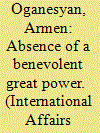

|
|
|
|
|
| Publication |
2012.
|
| Summary/Abstract |
AMERICAN AUTHOR Anne O'Hare McCormick (1880-1954), whose life experience was interwoven with both world wars, packaged into a single phrase the lessons to be derived from the tumultuous epochs when she famously wrote: "Today the real test of power is not capacity to make war but the capacity to prevent it."
|
|
|
|
|
|
|
|
|
|
|
|
|
|
|
|
| 2 |
ID:
126736
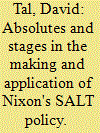

|
|
|
|
|
| Publication |
2013.
|
| Summary/Abstract |
President Richard Nixon and his National Security Adviser, Henry Kissinger took great pride in their success to achieve agreements on the limitation of Anti Ballistic Missiles and the Interim Agreement on Strategic Missiles with the Soviet Union. For Nixon, this agreement was not only an achievement that had been denied to his predecessor, it also seemingly represented the success of his own approach over that of his predecessors. Nixon-in tandem with Kissinger-intended to link arms control negotiations with the Soviet Union to the resolution of other political problems such as Vietnam, the Mideast, and Berlin. Through the employment of linkage, they hoped to make U.S. arms control policy part of Détente. However, Nixon was able to sign the "historic agreements" because his policy of linkage had in fact failed. It failed mainly because it was based on flawed assumptions and false premises. Thus, the historic success was possible precisely because Nixon had not actually made his arms control policy "distinct" from that of the Johnson Administration and its predecessors in his approach to strategic arms talks with the Soviet Union
|
|
|
|
|
|
|
|
|
|
|
|
|
|
|
|
| 3 |
ID:
133777
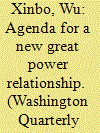

|
|
|
|
|
| Publication |
2014.
|
| Summary/Abstract |
Well begun is half done," Aristotle once said, meaning that beginning a project well makes it easier to do the rest. Yet, this may not be true of China-U.S. relations during Obama's presidency. Although the Obama administration secured a smooth transition from the George W. Bush years and attached high priority to relations with China during its first year in office, bilateral relations turned downward over the rest of Obama's first term, leaving a legacy of growing mutual suspicion and rising competition between the two countries, especially in the Asia-Pacific region. In spite of the November 2009 bilateral agreement to build a "positive, cooperative, and comprehensive relationship,"1 the two sides missed opportunities for more cooperation while mishandling and even misguiding bilateral ties on some points.
|
|
|
|
|
|
|
|
|
|
|
|
|
|
|
|
| 4 |
ID:
076537


|
|
|
| 5 |
ID:
126581
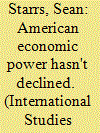

|
|
|
|
|
| Publication |
2013.
|
| Summary/Abstract |
This paper argues that a fundamental failing in the debate on the decline of American economic power is not taking globalization seriously. With the rise of transnational corporations (TNCs), transnational modular production networks, and the globalization of corporate ownership, we can no longer give the same relevance to national accounts such as balance of trade and GDP in the twenty-first century as we did in the mid-twentieth. Rather, we must summon data on the TNCs themselves to encompass their transnational operations. This will reveal, for example, that despite the declining global share of United States GDP from 40% in 1960 to below a quarter from 2008 onward, American corporations continue to dominate sector after sector. In fact, in certain advanced sectors such as aerospace and software-even in financial services-American dominance has increased since 2008. There are no serious contenders, including China. By looking at the wrong data, many have failed to see that American economic power has not declined-it has globalized.
|
|
|
|
|
|
|
|
|
|
|
|
|
|
|
|
| 6 |
ID:
130237
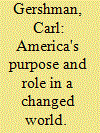

|
|
|
|
|
| Publication |
2014.
|
| Summary/Abstract |
Public opinion reports on Americans' attitudes toward foreign policy sketch a picture of retrenchment, war-weariness, and skepticism toward global engagement, even as there is also a growing concern that the world is increasingly unstable and dangerous. Nothing about this picture is new or controversial. Some may worry about it more than others, but it is now commonly accepted that the US is downsizing its international role, and that the administration, the Congress, and the general public are more absorbed with domestic concerns than with foreign challenges or threats.
|
|
|
|
|
|
|
|
|
|
|
|
|
|
|
|
| 7 |
ID:
130238
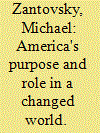

|
|
|
|
|
| Publication |
2014.
|
| Summary/Abstract |
It is not a new observation that, just as the twentieth century started late, with the shots in Sarajevo, so did the twenty-first century, with the September 11th attacks. Compared to the conflagration that followed the first event, whose centennial this year is a welcome opportunity for some belated soul-searching, the bloodshed that started with the second event has been limited, but its consequences may have been just as profound. The two American administrations that inherited the post-September 11th world have since struggled, along with the rest of the world, with the consequences. One chose to confront the evil head-on, in order to eradicate its sources and deter its repetition, with mixed results. The other largely opted for seeing and hearing little evil, with results that the jury is still out considering.
|
|
|
|
|
|
|
|
|
|
|
|
|
|
|
|
| 8 |
ID:
138723


|
|
|
|
|
| Summary/Abstract |
Since its European settlement in 1788, Australia has been dependent on great-power protectors for its security. Initially this security was achieved by virtue of Australia’s status as a British colony, later as a member of the British Commonwealth. In return for its protection, Australia committed military forces in support of British interests to the Sudan, in the Boer War, and in the First and Second World Wars. Australian support for these actions was premised on two key factors: Australia’s membership in the Empire (and with that the identity of its citizens as “independent Australian-Britons”) and the assessment, universal among Australians, that support and protection of the Empire and of British interests were also in their interest
|
|
|
|
|
|
|
|
|
|
|
|
|
|
|
|
| 9 |
ID:
058760


|
|
|
|
|
| Publication |
Jan-Feb 2005.
|
|
|
|
|
|
|
|
|
|
|
|
|
|
|
|
| 10 |
ID:
131848
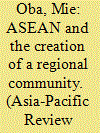

|
|
|
|
|
| Publication |
2014.
|
| Summary/Abstract |
After the ASEAN Concord II called for the building of an ASEAN Community in 2003, the creation of an ASEAN Community became a concrete part of the political agenda for the nations of Southeast Asia, and an ASEAN Community is scheduled to be created in 2015. However, it will all be for naught if the ASEAN Community that is established does not truly contribute to the stability and prosperity of the region. From this point of view, the article will attempt to evaluate the development of an ASEAN community concept and efforts to create it. To clarify the ideal of a true community, this article will take up Karl Deutsch's concept of "pluralistic security communities" and reconsider what a community requires. The article will state that the efforts to create an ASEAN Community should not be underestimated, and the blueprints for the creation of the ASEAN Community outline the formation of a true regional community. It will, however, conclude that in reality there exist factors within the ASEAN region that may shake the development of an ASEAN Community. It has to be said that the fostering of a sense of community at the level of ordinary people, as well as the creation of a community in which fundamental values and norms are shared, are distant propositions.
|
|
|
|
|
|
|
|
|
|
|
|
|
|
|
|
| 11 |
ID:
127132
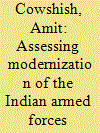

|
|
|
|
|
| Publication |
2014.
|
| Summary/Abstract |
India's quest for modernization of the armed forces is propelled by the persistent threat to its territorial integrity and the aspiration of becoming a great power. However, there is no clearly defined comprehensive policy, much less a carefully crafted strategy, for time-bound modernization of the armed forces and there is no mechanism in place to steer the modernization programme in a holistic manner. In fact, there is considerable ambiguity about the core question as to what constitutes comprehensive 'modernization'. Consequently, it is left to the services to chalk out their own 'modernization' plans.
|
|
|
|
|
|
|
|
|
|
|
|
|
|
|
|
| 12 |
ID:
130606
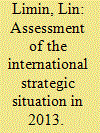

|
|
|
|
|
| Publication |
2014.
|
| Summary/Abstract |
The international strategic situation in 2013 appeared very calm than ever before and had no outstanding features; the fact of its having no special feature was its de?ning characteristic. Although 2013 could be
characterized as a normal year, the international strategic situation has undergone some profound changes. One of the most important is that the United States may have quietly given up its role of the "world police." The 'post-American era' has begun to arrive without attracting much attention in the international community. Many of these profound changes, including the long-term downturn of the world economy, the ongoing process of the West 's decline and the rise of the East, the endless chaos in the Middle East, readjustments in the international order and great power relations, and the evolving relationship between China and the U.S. are all closely related with this dawning of the 'post-American era.' Thus, the 2013
international strategic situation could be seen as holding the seeds of greater change than has been seen since the collapse of the Soviet Union in 1991.
|
|
|
|
|
|
|
|
|
|
|
|
|
|
|
|
| 13 |
ID:
132412
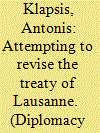

|
|
|
|
|
| Publication |
2014.
|
| Summary/Abstract |
In June 1925, General Theodoros Pangalos imposed his dictatorship on Greece. During his 14-month rule, he set as one of his basic foreign policy goals the revision of the territorial settlement imposed on Greece and Turkey by the 1923 Treaty of Lausanne. Wanting to secure Eastern Thrace and possibly even part of Western Asia Minor for Greece, Pangalos sought the backing of at least one Great Power with interests in the region, in this case Italy, as its dictator, Benito Mussolini, remained equally hostile and aggressive toward Turkey. Pangalos tried to reach an understanding with Mussolini concerning the possibility of joint Greco-Italian action against Turkey. The first signs of closer co-operation came in early July 1925 when the Italian under-secretary of foreign affairs, Dino Grandi, visited Athens for discussions with Pangalos. However, a more important initiative involved the official visit of two Greek ministers-Loukas Kanakaris-Roufos, the foreign minister, and Anastasios Tavoularis, the transport minister-to Rome in early March 1926. They met with Mussolini who, because of British pressure, now seemed reluctant about Pangalos' ambitious plans for joint action against Turkey. The Greek leader's hopes to revise Lausanne ended.
|
|
|
|
|
|
|
|
|
|
|
|
|
|
|
|
| 14 |
ID:
133061
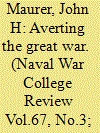

|
|
|
|
|
| Publication |
2014.
|
| Summary/Abstract |
Winston Churchill is best remembered as a valiant leader in times of war. He should also be remembered, however, for his efforts to prevent the catastrophic great wars that would scar the history of the twentieth century. While it is largely forgotten today, on the eve of the First World War Churchill made a remarkable attempt to halt the head-to-head competition in naval armaments that was setting Great Britain and Germany against one another as adversaries. In a bold and unconventional initiative, Churchill invited Germany's rulers to take a "holiday" from the competitive building of battleships. As the civilian head of Britain's Royal Navy, Churchill made public appeals for a naval holiday on three separate occasions before 1914. Behind the scenes too he pressed for the opening of negotiations with Germany, using the holiday proposal as the starting point for discussions. It was Churchill's earnest hope that the naval holiday would stop the action-reaction dynamic of the arms race-what statesmen of that era called "the sea war waged in the dockyards"-and reduce the antagonism between Britain and Germany. Rather than letting Britain and Germany be arrayed in opposing camps, he wanted to promote cooperation between Europe's two leading great powers.
|
|
|
|
|
|
|
|
|
|
|
|
|
|
|
|
| 15 |
ID:
126586


|
|
|
|
|
| Publication |
2013.
|
| Summary/Abstract |
Using the 'achievement index', a country's relative size of gross domestic product divided by its relative size of population, I argue that the high-achieving position of the West, as a structural distortion, has been a principal source of instability in the modern international system. Rather than being just unsatisfied great powers, large high achievers and stagnant low achievers engage in hegemonic and counter-hegemonic warfare, respectively. Both hierarchy and balancing systems are structurally more stable if they are 'natural' and less stable if they are 'unnatural', with being natural defined as an achievement index of 1. The rise of the rest constitutes a long-term trend back to nature, beginning to flatten the heretofore skewed international structure, which lessens one source of modern system-level instability. With a much larger share of world population, China cannot rise to the same relative height as the West that rose with a much smaller share of the population. China's rise is thus unlikely to repeat the past experience of the rising West.
|
|
|
|
|
|
|
|
|
|
|
|
|
|
|
|
| 16 |
ID:
165536
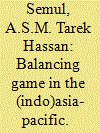

|
|
|
|
|
| Summary/Abstract |
The (re)emergence of China and the relative decline of the power of the United States (US) as the unipolar super power has shifted the geostrategic centre of gravity towards the Asia-Pacific region, also known in its extended form as Indo- Pacific region. Multiple new and frozen flashpoints have emerged in this region as China is increasingly seeking to tilt the power balance in its favour and the US is growing doubtful and impatient regarding the Chinese intentions. To mitigate the China threat, the US has already rebalanced its foreign policy under the Obama administration from the Middle East to the Pacific and current President Trump has extended the geographical reach of his new grand strategy of Free and Open Indo-Pacific to bring the Indian Ocean into play. One of the most predominant discourses that tries to explain this emerging great power relation and power transition is the ‘Thucydides Trap’. This discourse maintains a binary understanding that in a bipolar setting, the rise and decline of great powers make war inevitable. However, this oversimplified assumption may lead to a limited understanding of a region which has emerged with the support of the liberal order and slowly replacing the West as the epicentre of economic progress. This paper argues that there are ‘other discourses’ where middle and smaller regional powers not necessarily stranded between great power rivalry, rather they renegotiate the order in the (Indo)Asia-Pacific region to create multipolarity. On the contrary, the interdependence of the US and China in a globalized world compels the great powers to find ways to keep peace in the troubled waters of the Indo-Pacific. To find out to what extent all these discourses are intertwined and influence each other is another objective of this paper.
|
|
|
|
|
|
|
|
|
|
|
|
|
|
|
|
| 17 |
ID:
142112


|
|
|
|
|
| Summary/Abstract |
Does neorealism offer a convincing account of great power balancing behavior? Many scholars argue that it does not. This conclusion rests on a misunderstanding of neorealist theory and an erroneous reading of the evidence. Properly specified, neorealism holds that great powers place an overriding emphasis on the need for self-help. This means that they rely relentlessly both on arming and on imitating the successful military practices of their peers to ensure their security. At the same time, they rarely resort to alliances and treat them with skepticism. There is abundant historical evidence to support these claims. Since 1816, great powers have routinely achieved an effective balance in military capabilities with their relevant competitors and promptly copied the major military innovations of the period. Case studies show that these outcomes are the product of states' efforts to ensure security against increasingly capable rivals. Meanwhile, the diplomatic record yields almost no examples of firm peacetime balancing coalitions over the past 200 years. When alliances have formed, great powers have generally doubted the reliability of their allies and of their opponents' allies. Thus neorealism provides a solid foundation for explaining great power balancing behavior.
|
|
|
|
|
|
|
|
|
|
|
|
|
|
|
|
| 18 |
ID:
134088


|
|
|
|
|
| Publication |
2014.
|
| Summary/Abstract |
One reason why Europe went to war in 1914 is that all of the continental great powers judged it a favorable moment for them to fight, and all were more pessimistic about postponing the fight until later. Not only is this historical paradox an interesting puzzle in its own right, but it sheds light on what is arguably the reigning theory of the causes of wars in general: James Fearon's rational bargaining theory. None of Fearon's three main mechanisms-private information, commitment problems, or indivisibility of stakes-can explain the paradox of the universal, simultaneous view of 1914 as a favorable year for war. Two mechanisms that play a marginal role in his analysis, however-bounded rationality in multidimensional power assessments and attempts to mitigate power shifts through coercive diplomacy-help to explain how Europe's powers became trapped in a choice between war now and war later. These mechanisms were set in motion by background strategic assumptions rooted in the culture of militarism and nationalism that perversely structured the options facing Europe's political leaders in 1914. Whereas Fearon's theory assumes that states are paying equal attention to all relevant information, in 1914 each power's strategic calculations produced disproportionate levels of self-absorption in its own domestic concerns and alliance anxieties.
|
|
|
|
|
|
|
|
|
|
|
|
|
|
|
|
| 19 |
ID:
131700
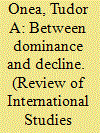

|
|
|
|
|
| Publication |
2014.
|
| Summary/Abstract |
This article investigates the role of status considerations in the response of dominant powers to the rise of emergent states. Accordingly, the hypothesis explored is that dominant actors are prone to fear that they will lose their upper rank, and, due to this status anxiety, resist the efforts of emergent powers to match or surpass them. The article begins by explaining why political actors deem status important and puts forward a theory of status anxiety in world politics. The more pronounced is this anxiety across status dimensions (economic and military capabilities as well as prestige), the higher the likelihood of conflict. This argument is then tested against competing theories of dominant power behaviour in two cases: the relations between France and Britain from the 1740s to Napoleon and those between Britain and Germany from the 1880s to World War One.
|
|
|
|
|
|
|
|
|
|
|
|
|
|
|
|
| 20 |
ID:
170678


|
|
|
|
|
| Summary/Abstract |
The BRICS are at a turbulent crossroads as renewed great power competition intersects with countervailing tendencies in the emerging multipolar arena. Their success depends avoiding the external costs and domestic pathologies generated by great power friction. Emerging multipolarity provides opportunities for manoeuvre, but only if outsized China accommodates the other BRICS as it competes against the United States. The BRICS’ strongest common aversion concerns American hegemony and its weaponization of finance. BRICS states are defensively motivated to develop mechanisms to limit infringements on their sovereignty and autonomy. However, in China and Russia financial nationalism is also rising, bolstering Renminbi internationalization
|
|
|
|
|
|
|
|
|
|
|
|
|
|
|
|
|
|
|
|
|